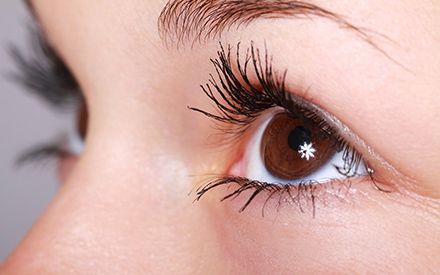Vision Care Blog
Eye Exams Test More Than Eyesight

Eye exams test more than what you can see – a comprehensive eye exam performed by a doctor of optometry can reveal telling changes about your health
As we age, our health can be both a reward and a challenge. Whether you’re active or idle, starting your first job or thinking about retirement, there are steps you can take to maintain your best possible eye health as you get older.
Infants and toddlers
Even as an infant, regular visits to a Doctor of Optometry is important. Infants love to look at lights which makes the eye exam easy. Doctors of optometry recommend children have their first eye exam at six months of age and then annually until they’re adults.
During your child’s first eye exam, a doctor of optometry assesses your child’s visual abilities, ensuring the eyes are properly aligned, free of congenital cataracts and developing normally. They also look to detect and treat eye conditions, such as strabismus (crossed eyes) and amblyopia (lazy eyes), before irreversible damage is done.
Outside of routine eye exams, children at this age often see their doctor of optometry for eye infections. Itchy, painful or swollen eyes are all common signs of an infection. If caught early, the spread of infection can be limited, avoiding more serious complications. Some of the most common infections are caused from blocked tear ducts or conjunctivitis, better known as pink eye.
School aged children
Eye health takes on added importance when your child enters the classroom. A school-age child’s eyes are constantly in use and if visual skills are lacking or impaired, your child will need to work harder to concentrate and learn.
At this age, doctors of optometry look for eye conditions such as myopia (nearsightedness), hyperopia (farsightedness) and astigmatism. As a parent, it’s difficult to know how well your child can see and many of these conditions go undetected without an eye exam. In many cases, a child can have a dominant eye, which can easily mask a vision problem.
Common signs and symptoms of a vision problem include:
- Headaches or irritability
- Avoidance of near or distance work
- Covering or rubbing of the eyes
- Tilting of the head or unusual posture
- Using a finger to maintain place while reading
- Losing place while reading
- Omitting or confusing words when reading
- Performing below their potential
To ensure your child can see clearly, it is recommend that they have an eye exam each year they’re in school.
Adults
For adults, an annual eye exam is an important part of maintaining your overall health and a necessary step in slowing the progression of aging eyes.
During your exam, your doctor of optometry will look for the onset of age related conditions. Diabetic retinopathy, glaucoma, retinal detachment, cataracts and age-related macular degeneration are all conditions that can be better treated with early detection. Even the common nuisance of dry, itchy eyes can be effectively managed with simple, routine visits to your doctor of optometry.
Other health conditions may warrant more frequent examination such as adults who have diabetes or glaucoma.
As our eyes age, questions and issues emerge that need answers and solutions. It’s important to remember that eye exams are not just about getting new glasses, but about caring for and protecting the most valuable sense we have – sight.
